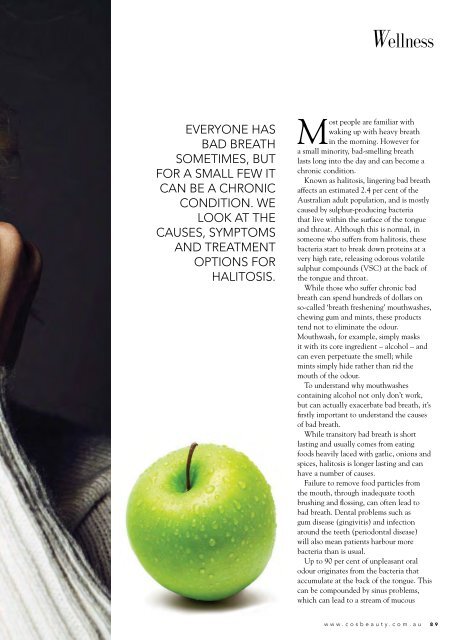CosBeauty Magazine #81
CosBeauty is the #BeautyAddict's guide to lifestyle, health and beauty in Australia. In this issue we look at: • Essential Exfoliation - Smooth Skin for Spring • Why your Beauty Sleep is really important • 40 over 40 - Anti-ageing must have products • Tassie Road Trip • Lauren Hannaford - FHIT for Life • Face Value - Facial Surgeries explained
CosBeauty is the #BeautyAddict's guide to lifestyle, health and beauty in Australia. In this issue we look at:
• Essential Exfoliation - Smooth Skin for Spring
• Why your Beauty Sleep is really important
• 40 over 40 - Anti-ageing must have products
• Tassie Road Trip
• Lauren Hannaford - FHIT for Life
• Face Value - Facial Surgeries explained
Create successful ePaper yourself
Turn your PDF publications into a flip-book with our unique Google optimized e-Paper software.
Wellness<br />
Everyone has<br />
bad breath<br />
sometimes, but<br />
for a small few it<br />
can be a chronic<br />
condition. We<br />
look at the<br />
causes, symptoms<br />
and treatment<br />
options for<br />
halitosis.<br />
Most people are familiar with<br />
waking up with heavy breath<br />
in the morning. However for<br />
a small minority, bad-smelling breath<br />
lasts long into the day and can become a<br />
chronic condition.<br />
Known as halitosis, lingering bad breath<br />
affects an estimated 2.4 per cent of the<br />
Australian adult population, and is mostly<br />
caused by sulphur-producing bacteria<br />
that live within the surface of the tongue<br />
and throat. Although this is normal, in<br />
someone who suffers from halitosis, these<br />
bacteria start to break down proteins at a<br />
very high rate, releasing odorous volatile<br />
sulphur compounds (VSC) at the back of<br />
the tongue and throat.<br />
While those who suffer chronic bad<br />
breath can spend hundreds of dollars on<br />
so-called ‘breath freshening’ mouthwashes,<br />
chewing gum and mints, these products<br />
tend not to eliminate the odour.<br />
Mouthwash, for example, simply masks<br />
it with its core ingredient – alcohol – and<br />
can even perpetuate the smell; while<br />
mints simply hide rather than rid the<br />
mouth of the odour.<br />
To understand why mouthwashes<br />
containing alcohol not only don’t work,<br />
but can actually exacerbate bad breath, it’s<br />
firstly important to understand the causes<br />
of bad breath.<br />
While transitory bad breath is short<br />
lasting and usually comes from eating<br />
foods heavily laced with garlic, onions and<br />
spices, halitosis is longer lasting and can<br />
have a number of causes.<br />
Failure to remove food particles from<br />
the mouth, through inadequate tooth<br />
brushing and flossing, can often lead to<br />
bad breath. Dental problems such as<br />
gum disease (gingivitis) and infection<br />
around the teeth (periodontal disease)<br />
will also mean patients harbour more<br />
bacteria than is usual.<br />
Up to 90 per cent of unpleasant oral<br />
odour originates from the bacteria that<br />
accumulate at the back of the tongue. This<br />
can be compounded by sinus problems,<br />
which can lead to a stream of mucous<br />
www.cosbeauty.com.au 89

















